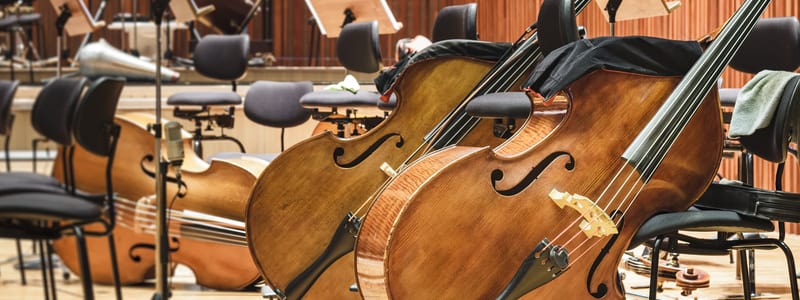
Nothing has changed the way we think about and create music like the internet has. Artists and technicians collaborate with each other from opposite sides of the planet, and have the ability to release any song they like to a global audience with the touch of a button. You might not realize it, but music education at the college level has kept pace with that expansion of technology. Innovations in learning have now made it possible to pursue an online music degree, and enter the rewarding world of music.
There is sometimes a stigma that due to the part-time or self-employed nature of many musicians, studying for a music degree, even from an online music school, isn't as worthwhile as other subjects. While it's true that only the top practitioners earn the sort of money you would in a high-demand STEM field, professional musicians still do better than the average worker according to the Bureau of Labor Statistics. Music directors and composers have a median annual salary of $50,110, while musicians themselves make $25.14 per hour on average. There are also great opportunities like being a sound engineer or teaching music to others that offer stable, well-paying jobs. All of these careers can be easier to succeed in by attending an online music school.
What Are The Most Innovative College Music Programs?
| 1 |
Berklee College of Music Boston, MA |
Innovation has helped this premier music school in Boston churn out a constant stream of Grammy-winning and other accomplished music professionals, from Quincy Jones ('51) to John Mayer ('98). In the '50s, that innovation was introducing jazz into the classroom. Today Berklee stays cutting-edge with programs like Berkleemusic, its arm for online music instruction anywhere in the world. The organization partners with companies like Noteflight, a digital music notation software company, to keep musical education up to speed with other higher ed subjects that are moving to the Web. Aspiring musicians need not even be college-aged to take advantage of Berklee educators' experience. Through the Berklee PULSE site, kids from grades 4-12 can get online training in vocals, instruments, and ensemble performance. |
Visit Site |
| 2 |
Stevens Institute of Technology Hoboken, NJ |
This small, private school in Hoboken holds itself to a high standard with the self-applied nickname "the innovation university." Through the Music & Technology Program, they seem to be living up to the moniker. For example, students seeking a degree in production, recording, and sound design do more than hit the record button. Through physics, engineering, and technology, they learn how the brain processes sound. Collaborations between the music department and others at the school turn up projects with futuristic names like "A 'Transderivational' Search Engine for Creative Analogy Generation in Mixed-Media Design." |
Visit Site |
| 3 |
Bard College Conservatory of Music Annandale-On-Hudson, NY |
Operating on the belief that to be well-rounded artists, musicians need instruction in more than music, Bard has taken the innovative step of requiring every undergrad to earn a double degree in five years: one in music, and the other in the liberal arts. The school pulls it off by being small and flexible and working closely with each student. The school is also a founding member of the social change project Take A Stand that seeks to use music to "inspire children, families, and communities to realize their potential and break the cycle of poverty." |
Visit Site |
| 4 |
Florida State University Tallahassee, FL |
As one of the largest music programs in all of academia, FSU's College of Music might be expected to be sluggish and resistant to change. On the contrary, the Seminoles are engrossed in some very exciting work in the field of music, thanks to its three music research centers: the Center for Music Research, the Center for Music of the Americas, and the National Institute for Infant & Child Medical Music Therapy. The college offers opportunities to study uncommon topics like piano technology, where students delve into geometrics, diagnostics, and restoration of the instruments, and sacred music, which involves coursework from across the university, including history, philosophy, and religion. |
Visit Site |
| 5 |
Eugene Lang College of Liberal Arts at The New School New York, NY |
With its system of student-directed curricula, Lang is already securely on the innovative side of higher education. Add to that an eclectic mix of courses offered within its walls, and you've got one of the most innovative music programs in the country. Classes like Hip Hop, Punk and Noise, Poetics of Song, and Musical Borrowing from Plainchant to Sampling, just to name a few, require little musical knowledge but foster appreciation of a wide variety of musical styles through discussion and interaction. Through the Mannes classical music conservatory, both children and adults are able to receive training from a faculty consisting of working, accomplished musical professionals. |
Visit Site |
| 6 |
Elmhurst College Elmhurst, IL |
Music students here have the ability to become bona fide recording artists before they even graduate, thanks to Elmhurst’s own recording studio. Although budget problems have highlighted a need for more performance venues, at the Gretsch Recording Studio, student musicians can get comfortable with professional-grade mics and sound processing equipment. Elmhurst is also a leading music school for internship placement for its music majors. Depending on their degree plans, students land spots with the Chicago Symphony Orchestra, Universal Records, major radio stations, and more. And its faculty of symphony pros and recording artists helps the school keep its finger on the pulse of the latest teaching and practicing methods in music. |
Visit Site |
| 7 |
McNally Smith College of Music Saint Paul, MN |
Music students here have the ability to become bona fide recording artists before they even graduate, thanks to Elmhurst's own recording studio. Although budget problems have highlighted a need for more performance venues, at the Gretsch Recording Studio, student musicians can get comfortable with professional-grade mics and sound processing equipment. Elmhurst is also a leading music school for internship placement for its music majors. Depending on their degree plans, students land spots with the Chicago Symphony Orchestra, Universal Records, major radio stations, and more. And its faculty of symphony pros and recording artists helps the school keep its finger on the pulse of the latest teaching and practicing methods in music. |
Visit Site |
| 8 |
Mills College Oakland, CA |
McNally follows a similar approach to the Bard College conservatory, in that it ties music in with other fields of study like liberal arts in order to make students as well-rounded as possible. McNally prides itself on its progressive Hip Hop Studies program, that offers career paths for emcees, artist management, or more. The school is also on the front lines of promoting music to a younger crowd through its postsecondary program, which allows high school seniors access to its college-level music courses at no cost. |
Visit Site |
| 9 |
Babson College Wellesley, MA |
For sheer music innovation, Mills has been an all-star for decades. In 2008 the school celebrated "80 years of musical innovation." With its environment that fosters experimentalism, the college is a worldwide destination for students who come to hear new sounds and be exposed to new modes of thinking about music, and to hopefully find their own unique voice. Since 1966, the school's hub for innovation has been the Center for Contemporary Music, fostering cutting-edge developments in computer and electroacoustic music, especially. Students are also afforded opportunities to study exotic topics like gamelan from Indonesia, African drumming, and more. |
Visit Site |
Getting an Online Music Degree
Traditionally, music programs tend to focus on performance and instrumentation. As such, music is one of those areas where getting a music degree online might seem odd or even impossible. That's no longer true. Some programs focus more on the side of sound engineering or production, the basics of which can be taught and turned in for appraisal through common computer programs. Online music production courses are becoming much more common, and music production schools' online offerings get better and better.
Composition, music history, and music theory are other areas which can be specialized in while getting an online music degree. You don't necessarily have to show up in person to explore the rich history of classical music or American jazz, and distance education on the finer points of composition goes all the way back to correspondence between the European maestros or further.
If none of that suits you, some schools will teach the fine art of piano design, maintenance, restoration, and repair online. And yes, there are even schools which have begun to offer a traditional instrument performance music degree online. Teaching people songs and styles is already a staple of many YouTube content creators, and prestigious schools are getting in on the act these days. It's very possible that soon getting online music degrees will be no different than getting traditional ones! Here are some of your best and most innovative options for an online music degree.
To determine the most innovative college music degrees, we looked at the most important factors prospective students, mainly common predictors of future success and a school's commitment to online programs. This boils down to admissions rate, student loan default rate, retention rate, graduation rate, and the percent of students enrolled in online classes. All data points are taken from information provided by colleges and universities to the National Center for Education Statistics.
Each factor is weighted evenly in order to give an objective view and determine the top most innovative college music degrees. To calculate our rankings, we looked at a school's ranking when organized by a single factor, and then averaged each category's ranking to find an overall score: Admissions Rate (20%) + Default Rate (20%) + Retention Rate (20%) + Graduation Rate (20%) + Percent of Students Enrolled in Online Classes (20%) = Final score.
